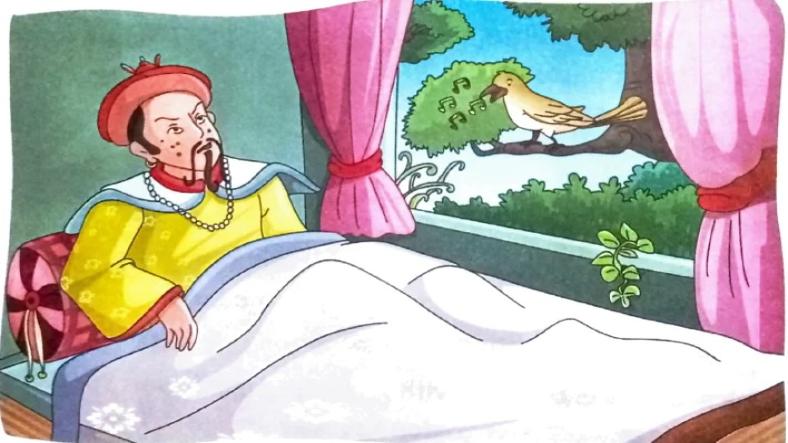Once upon a time, in a grand palace in China, there lived an emperor who was known for his love of beautiful things. His palace was adorned with the finest silks, golden statues and rare jewels. But what fascinated people the most was the emperor's garden, which was filled with exotic flowers and magnificent trees. Beyond the garden lay a forest and deep within this forest was a nightingale with the most enchanting voice anyone had ever heard.
One day, the emperor read a book that praised the beauty of his kingdom and described the nightingale's song as the most beautiful sound in the world. Surprised that he had never heard of this bird, the emperor ordered his courtiers to find the nightingale and bring it to him.
The courtiers searched high and low until they finally found the little brown bird. They brought the nightingale back to the palace and when it began to sing, its voice was so beautiful that the emperor was moved to tears. "You are truly the most precious treasure in my kingdom," the emperor said and he kept the nightingale in a golden cage, demanding that it sing for him every day.
The nightingale, though happy to please the emperor, longed for the freedom of the forest. Yet, it continued to sing, hoping to bring joy to the emperor.
One day, a gift arrived at the palace—a beautiful, jeweled mechanical bird that could sing at the pull of a lever. It was covered in gold and jewels and its tune was perfect and predictable. The emperor was fascinated by the mechanical bird and soon ignored the real nightingale, preferring the jeweled creation instead.
Feeling unwanted, the real nightingale slipped out of its cage and returned to the forest, where it could sing freely once more. The emperor didn’t notice at first, as he was mesmerized by the mechanical bird.
Over time, however, the mechanical bird began to break down. Its tune became stiff and repetitive and eventually, it stopped working altogether. The emperor tried to have it repaired, but it could no longer sing like it once did. Heartbroken, the emperor grew sick and weak, as he missed the beautiful music that had once brought him joy.
One night, as he lay in bed, weak and regretful, the emperor heard a familiar, enchanting song. The real nightingale had returned and it sang so sweetly that the emperor felt his heart filling with peace and happiness. The bird’s melody was filled with warmth and emotion, unlike the mechanical bird’s perfect but soulless tune.
The emperor, moved by the nightingale’s kindness, asked, “Will you stay with me and sing every night?”
The nightingale replied, “I will stay as long as you don’t try to keep me in a cage. I will come and go as I please, but I will always sing for you.”
The emperor agreed and from that day on, the nightingale sang for the emperor every night. Its song healed his heart and he learned the value of appreciating true beauty, which could not be replaced by lifeless imitations.
Moral of the story: "True beauty and happiness cannot be bought or captured; they must be cherished in their natural form." Things of genuine value are often irreplaceable and we should appreciate them while we have them instead of taking them for granted.
Thanks for reading the article, for more quick reads read our peoples blog articles.












